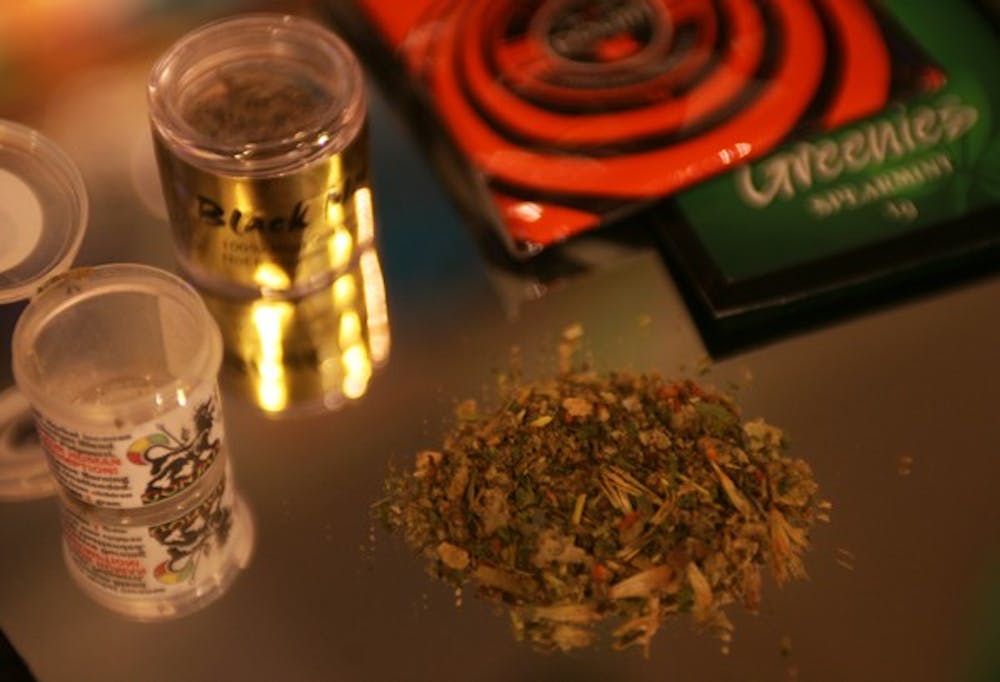Clarification (Feb. 25 1:57 a.m.): This story identifies former UNC student William Munsee as a seller of imitation marijuana. He is William Munsee Jr.
Pot. Weed. Bud. Ganja. Reefer.
No matter which term you use, smoking marijuana is illegal in North Carolina.
But now a legal alternative is becoming popular with college students and drawing skepticism from lawmakers.
Imitation marijuana, also known as “spice” or “herb,” is a mixture of several plants and herbs sprayed with a chemical that imitates tetrahydrocannabinol, or THC, the psychoactive ingredient in marijuana.
Unlike the real thing, imitation marijuana — most commonly known as K2 — does not show up on most drug tests and is legally sold in many tobacco and specialty stores, including Expressions and HazMat of Chapel Hill. Both stores have recently seen spikes in interest.
“We get people calling and coming in and asking several times a day, especially in the last three to four months” said Erik Fanning, manager of Cherry Pie, which does not sell imitation marijuana but sells tobacco accessories.
“Part of the reason we as a business have decided not to carry it is that these products come and go. Usually it’s only a matter of time before it’s made illegal or banned.”
In the meantime, students have taken advantage — both Expressions and HazMat said students were their biggest buyers of the imitation marijuana.
One senior, who also smokes marijuana, said he tried the imitation drug for the first time last week. He purchased another 3.5 grams from Expressions for $45 this week. He asked to remain anonymous because he participates in an illegal activity.
“I heard about it a couple years ago, but I never really took any stock in it until a friend of mine tried some,” he said. “Obviously because it’s legal, it’s a great alternative because it doesn’t preclude you from certain jobs, you can’t lose scholarships and you can’t get kicked out of school.”
Imitation marijuana’s high is not quite the same as the old-fashioned marijuana, he said.
“It’s definitely more of a body buzz, usually shorter highs,” he said. “It’s faster coming on, but I don’t think it lasts as long.”
William Munsee, a former UNC student, has decided to capitalize on the craze by contacting wholesale distributors and dealing one brand of imitation marijuana himself for the last month and a half to two months.
“I guess people are interested because it’s the trendy new thing to do for college students,” he said.
But lawmakers such as N.C. Rep. Nelson Dollar, R-Wake, are working to control the substance as its popularity skyrockets.
“We don’t need young people experimenting with this type of chemical,” Dollar said. “It can ruin their lives, it can ruin their health and it can lead them to do something they’ll regret for the rest of their lives.”
Dollar said he hopes the N.C. General Assembly will place the substance under “appropriate legal controls” as it did with salvia divinorum, a psychoactive plant that until last year was also legal in North Carolina.
“There’s no way to say exactly what you’re getting,” said Chuvalo Truesdell, public information officer for the U.S. Drug Enforcement Administration, Atlanta division.
“It’s much like playing Russian roulette — you don’t know where its coming from or what’s in it.”
Imitation marijuana came under increased scrutiny after legislators in Missouri and Kansas proposed legislation to make it a controlled substance. Critics of the bans say bans are unnecessary and are more about drug stigma than harm to users.
“They’re not popular with anyone but youth, and they cause no psychoactivity,” said Allen St. Pierre, executive director of the National Organization for the Reform of Marijuana Laws. “It’s all made from stuff you’d find in a mountain pasture anywhere in the world.”
Contact the State & National Editor at stntdesk@unc.edu.



